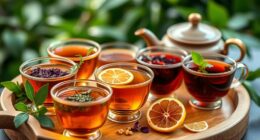Herbal solutions offer a natural approach to managing anger, leveraging the calming properties of chamomile, lemon balm, lavender, passionflower, and valerian root. These herbs can be consumed as teas, supplements, or incorporated into meals, promoting relaxation and reducing anxiety. However, it's essential to be aware of potential side effects, such as headaches and allergic reactions, and consult healthcare professionals for personalized guidance. By combining herbal remedies with mind-body techniques and monitoring health progress, individuals can develop a tailored approach to anger management. Explore the world of botanicals to uncover a holistic solution to tame anger.
Key Takeaways
• Herbal remedies like chamomile, lavender, and passionflower can help reduce anger by promoting relaxation and calmness.
• Incorporating herbal teas, essential oils, and supplements into daily routines can aid in anger management.
• It's essential to consult healthcare professionals to avoid potential side effects and tailor a personalized approach.
• Keeping a health journal and monitoring progress helps identify potential side effects and optimize herbal solutions.
• Combining herbal remedies with mind-body techniques, such as meditation and yoga, can enhance anger control and overall well-being.
Top Herbs for Anger Management
When it comes to taming anger, nature offers a wealth of effective solutions, with chamomile, lemon balm, lavender, passionflower, and valerian root standing out as top herbal contenders for calming the emotional storm. These herbs have been used for centuries to promote relaxation and reduce anxiety.
Chamomile, with its antioxidants and anti-inflammatory properties, helps soothe frazzled nerves. Lemon balm acts as a mild sedative, while lavender reduces anxiety and depression. Passionflower increases GABA levels, promoting a sense of calm. Valerian root, a natural tranquilizer, helps regulate sleep patterns and reduces irritability.
Herbal Remedies and Daily Use

By incorporating herbal remedies into daily routines, individuals can harness the calming effects of nature to manage anger and anxiety.
Herbal teas, such as chamomile and passionflower, can be sipped throughout the day to promote relaxation. Essential oils like lavender can be used in aromatherapy to reduce anxiety and depression. Additionally, supplements can be consumed to reap the benefits of valerian root's natural tranquilizing effects.
Herbs like basil, rosemary, and thyme can be incorporated into meals, while mint, parsley, and cilantro can be added to smoothies and juices. By incorporating these herbal remedies into daily life, individuals can experience a sense of calm and better manage their anger.
Potential Side Effects and Precautions

While herbal remedies can be a valuable tool for managing anger, it's equally important to recognize the potential side effects and take necessary precautions to guarantee safe and effective use.
Valerian root, for instance, may cause headaches and liver toxicity, whereas passionflower can induce drowsiness and confusion.
Chamomile may lead to allergic reactions and nausea, and lavender might cause skin irritation and headaches.
To ensure responsible use, it's imperative to consult healthcare professionals, start with small doses, check for allergies, and avoid mixing herbs without guidance.
Monitoring Health and Expert Guidance

Monitoring changes in mood and physical health is vital when using herbs for anger management, as it enables individuals to track their progress and respond to any adverse reactions promptly.
By keeping a health journal or consulting with a healthcare professional, individuals can identify potential side effects and adjust their herbal regimen accordingly.
It's also essential to seek expert guidance from herbalists, naturopathic doctors, or other qualified practitioners who can provide personalized advice on herbal use. They can help individuals develop a tailored approach to anger management, taking into account their unique health needs and medical history.
Optimal Use of Herbs for Anger

How can individuals guarantee they're getting the most out of herbal remedies for anger management? By recognizing potential side effects and taking precautions, consulting healthcare professionals for guidance, using high-quality products, and exploring botanical approaches, individuals can optimize their herbal remedies. Combining herbs with mind-body techniques like meditation and yoga can also enhance anger control.
| Herbal Strategies | Benefits |
|---|---|
| Recognize potential side effects and take precautions | Guarantees safe usage |
| Consult healthcare professionals for guidance | Personalized advice |
| Use high-quality products | Effective results |
| Explore botanical approaches | Holistic management |
| Combine with mind-body techniques | Enhanced anger control |
Frequently Asked Questions
Can I Use Herbal Remedies in Conjunction With Conventional Medicine?
She can use herbal remedies in conjunction with conventional medicine, but it's vital to consult healthcare professionals to guarantee safe integration.
Herbalists and naturopathic doctors can guide her in choosing compatible herbs and dosages. According to the National Center for Complementary and Integrative Health, 'it's essential to inform healthcare providers about all herbal supplements and medications being used.'
Are Herbal Remedies Suitable for Children and Pregnant Women?
Coincidentally, the suitability of herbal remedies for children and pregnant women raises concerns. While some herbs like chamomile and lavender appear safe, others may pose risks.
According to the American Botanical Council, 'pregnant or breastfeeding women should avoid using herbal remedies without consulting a healthcare provider.' Similarly, children's sensitivity to herbal ingredients warrants caution.
Consulting a qualified healthcare professional is essential before using herbal remedies in these vulnerable populations.
How Long Does It Take to See Results From Using Herbal Remedies?
She finds that the time it takes to see results from using herbal remedies for anger management varies depending on individual factors, such as the type of herb, dosage, and individual tolerance.
Generally, noticeable changes can occur within 2-4 weeks of consistent use, with best results often seen after 6-8 weeks. However, consulting with a healthcare professional is crucial to determine the best approach and monitor progress.
Can I Grow My Own Herbs for Anger Management Remedies?
One in five households in the United States grows their own herbs, according to the National Gardening Association.
She can grow her own herbs for anger management remedies, but it's crucial to verify that the herbs are of high quality and properly harvested. This involves researching the specific growing conditions, drying, and storage methods for each herb to maintain their potency.
Consulting with a herbalist or naturopathic doctor can provide guidance on cultivating and using herbs effectively.
Are There Any Herbal Remedies That Can Be Used in Emergency Situations?
She can utilize herbal remedies in emergency situations by keeping a calmness-promoting tea blend on hand, featuring chamomile, lemon balm, and passionflower.
For rapid anxiety relief, she can use aromatherapy with lavender essential oil or take a valerian root supplement.
In stressful moments, a few deep breaths with a peppermint or basil-infused oil can help calm the nerves, allowing her to regain composure and respond more thoughtfully.
Conclusion
As we conclude our journey through the domain of herbal solutions for anger management, one question lingers: can nature's gentle touch truly calm the turbulent tides of anger? The evidence suggests so.
By harnessing the therapeutic potential of herbs, individuals can regain emotional balance and reveal a path to wellness. As Dr. Kenneth Cohen, a renowned herbalist, notes, 'Herbal remedies offer a powerful yet gentle approach to addressing anger issues.'
By embracing these natural solutions, we can rediscover the serenity that lies within, and tame the flames of anger once and for all.










